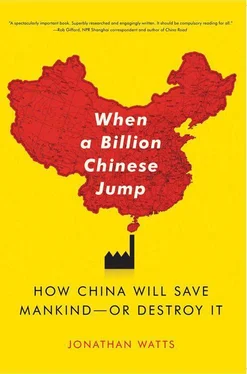“We have come to realize that a good environment gives us a competitive advantage,” the current mayor, Xia Deren, told me in the Japanese-built city hall. “This is a recent discovery. Practice has taught us the benefits of clean air and water in attracting talented personnel and high-value-added companies.”
Xia claimed to be going even further than his predecessor in greening Dalian. By his own reckoning, he spent more than a quarter of his time on policies to reduce emissions and improve energy efficiency. The city was pioneering the manufacture and adoption of hybrid buses and the hydrogen fuel cells that will be necessary if cars are ever to run solely on clean and efficient electricity. 36The city had also built up one of China’s biggest wind-power production bases and won the right to host China’s first national clean-energy laboratory. By 2013, said Xia, Dalian planned to go a step further than any other Chinese city in reducing carbon emissions by replacing all of the city’s coal-fired power plants with nuclear generators.
I asked Xia if he thought the nation could turn from red to green. 37His answer was unequivocal. “Yes, we should build a green China. We need to make our country greener and greener. All the top people in the world recognize this. I am confident that we will do more in the future for ecological conservation and sustainability.”
It was an encouraging message, though even Dalian still had a long way to go. Wen Bo, a native of the city and member of the Pacific Environment conservation group, warned against taking an overly rosy view of his home. “The city looks clean because the sea wind blows the pollutants away, but there are a lot of problems that are not visible,” he said. “We discharge a huge volume of solid waste into the ocean, which damages marine life, and our dirty factories have been relocated, not closed down, so the damage has simply moved from the urban to the rural environment.”
Clearly, there was no perfect model. Nuclear power had well-known risks. Solar energy led to pollution and waste during the manufacture of photovoltaic panels and the refinement of silicon. Up to a third of wind turbines spun uselessly in isolation because they were not connected to the grid. “Clean coal” technology was expensive and carbon sequestration largely unproven. There was a real danger of a bubble forming in the renewable energy sector as local governments rushed to jump on the bandwagon. Yet overall, the push for renewable energy was one of the most positive stories to come out of China in many years. The government was clearly determined to make a technological leap. It was good for business. It was good for national security. And it was good for prestige. In short, it was a power play. China was bidding to own the low-carbon economy of the future.
But this alone did not mean sustainability. China was still ramping up coal production, expanding power-intensive industries, and boosting consumption. Clean energy was just one more area in which to expand. In many ways, President Hu’s Scientific Outlook on Development is a rebranding exercise. Rather than genuine sustainability, it is economy lite. As with low-tar tobacco, low-alcohol beer, or low-fat cheese, it tacitly acknowledges the health concerns related to business as usual, but instead of promoting change it has watered down the product, slapped on a new label, raised the price, and aimed for an even bigger market.
The communist engineers in the politburo were trained to optimize production and enhance technology rather than trim demand and reappraise values. Though it has promised to create an eco-civilization, the government continues to prioritize economic growth, social stability, and enhanced national power. Overreliance on technology looks likely to take China further from a sustainable balance with nature.
It was time to return to Beijing. First, a last seafood dinner at a grill-your-own restaurant, then a dash to Dalian station, just in time to catch the 9:45 p.m. overnight train.
Many passengers were already getting their heads down, including an old man in the bunk below mine. But a gruff, middle-aged man opposite was in a garrulous mood. Seeing me open my laptop, he asked what I was doing.
“I’m trying to write a book.”
“What about?”
“China’s environmental problems.”
He snorted. “The problems are caused by foreigners. They pollute here what they can’t in their own countries.”
“Yes, that’s true. But China is also responsible.”
“Probably. The pollution is very bad. I live near the Bohai Sea. Have you seen it there? Terrible. It will take decades to clean up.”
He asks where I’m from.
“England.”
A louder snort. “That’s the country that first brought pollution to China.”
“We certainly didn’t help.”
Either tired or disappointed by the lack of verbal combat, he rolled over to sleep.
The next morning, the gruff man was in a mellower mood. We chatted in the corridor as other passengers, mostly men in their long johns, passed back and forth on their way to the washroom. He told me he was a police investigator. A gang of five thieves from Hunan had killed a woman in Dalian during a failed robbery, then fled to their home province. He was on his way to help hunt them down.
“Were the thieves black society?” I asked, using the Chinese term for organized crime.
“No, they were just poor and desperate,” he replied. “The economic downturn has made life tougher for a lot of people.”
The old man in the compartment returned from cleaning his teeth and joined in the conversation, which took an unexpected revolutionary turn as we approached the outskirts of Beijing.
“Which environment do you like better, Dalian or Beijing?” he asked, staring through the window as the brown fields of the countryside gave way to the gray buildings of the city.
“Dalian,” I replied. “It’s much cleaner, but I prefer to live in Beijing. My friends are here. It’s interesting. Pollution is a big problem, but I think it will improve in the future.”
The policeman interjected. “Right, in the past we took investment from anyone. Now we can afford to be more choosy. But clearing up the environment will take a long time because of corruption. Our officials don’t follow their own rules.”
The old man agreed. “The problem of a corrupt bureaucracy cannot be solved by bureaucrats. We need a mass movement to clear them out. I think there will be one within five years.”
The policeman said nothing. His generation had a different view of mass uprisings. The old man, now in his eighties, was in his prime during the triumph of the anti-imperialist revolution. The policeman, now in his fifties, spent his youth watching the abject failure of the Cultural Revolution. While both generations agreed on the need to clear up corruption and the environment, they differed on how it should be done.
Snow started to fall as we pulled into the terminus. A row of cleaners wearing Eastern Star uniforms were waiting on the platform to tidy up the train. The digital clock above their head read 8:25:07. After an eleven-hour journey, we had reached our destination seven seconds behind schedule. China could do the efficiency thing when it chose to. No doubt about that. But, as I was to learn, efficiency could create as many problems as it solved.
14. Fertility Treatment
Shandong
Dao zai shiniao (Tao is found in the shit and piss)
—Zhuangzi, Taoist philosopher, third century BC
Relying on efficiency can be dangerous for two reasons. The first is self-deception: focusing on small proportionate gains is often an excuse to ignore a big negative picture.
I learned this from a Zen Buddhist monk in Japan. Masahiro was one of my favorite students when I was teaching English in Kobe in the 1990s. He had recently inherited his father’s temple and made a good living from funeral ceremonies, where his chanting and calligraphy skills were put to good use. But apart from that and his bald head, we had a lot in common. Almost the same age, we would go drinking, smoking, wenching, playing football, and singing karaoke together. He would often drive back to his temple drunk in the early hours of the morning. I wondered how he squared this lifestyle with his role as a spiritual mentor. There was only one way to find out.
Читать дальше










